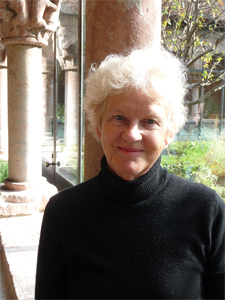“People like my brother are the ones you need to understand. Things are changing so fast. Now it is all computers, cell phones, and satellite TV. Not everyone adapts. His fundamentalism gives Shaheed a sense of certainty and being a mutawwa [member of the religious police] gives him respectability…but he never thinks before he acts; he just reacts. I try not to argue.”
When Sara h Moss, a physician in Madison, Wisconsin, falls in love with a fellow student, Ibrahim Suleiman of Khobar, Saudi Arabia, she is unable to persuade him to stay in the US. Instead, he persuades her to go to Saudi Arabia, where she obtains a job at the Suleiman Hospital in Khobar while she sees if she can adjust to Saudi life. What follows is a comprehensive exploration of Saudi families and Saudi society, especially the society of women and their roles in the larger Saudi world, and as Sarah learns more about the world of Saudi women, she must decide whether she can live among them forever as Ib’s wife.
h Moss, a physician in Madison, Wisconsin, falls in love with a fellow student, Ibrahim Suleiman of Khobar, Saudi Arabia, she is unable to persuade him to stay in the US. Instead, he persuades her to go to Saudi Arabia, where she obtains a job at the Suleiman Hospital in Khobar while she sees if she can adjust to Saudi life. What follows is a comprehensive exploration of Saudi families and Saudi society, especially the society of women and their roles in the larger Saudi world, and as Sarah learns more about the world of Saudi women, she must decide whether she can live among them forever as Ib’s wife.
American author Jean Grant, who lived (happily, she says) in Saudi Arabia for nine years, working for the Arab News, shows particularly sensitive insights into both the American and Saudi cultures, dealing with the big issues of women as “second class citizens,” the strict rules for modesty in clothing, the complications created when women must get permission from a man in the family even to obtain emergency medical treatment, the growing Islamist fundamentalism, and the brutal ad hoc punishments the mutawwa’in (religious police) mete out with impunity (fearing no reprisal from secular police). But she also shows the ways in which American women either make compromises in their lives, or, in other cases, refuse to make compromises which would make everyone’s life easier. As Sarah tries to get to know Ib’s family, she discovers what it will take if she is to experience the kind of freedom she needs within the strict boundaries of the family structure and the Muslim culture.
 The individual characters here represent some of the major issues to which Sarah must learn to adapt. Ib’s sister Layla, a relatively free spirit who loves brightly colored, fashionable burkhas, is a teacher in a public school for girls, thrilled by the chance to help mold the lives of her students so that they can grow up to make intelligent choices. Her husband, like Ibrahim, is on the liberal side of Muslim life. Their brother Shaheed, however, is a mutawwa of the strictest commitments, and he tries to impose his beliefs on the family at large, often arguing fiercely with Ibrahim. Shaheed’s wife, who is often seen bruised, quietly accepts his behavior toward her as her lot. It is Ib’s mother Malika who becomes the biggest stumbling block to Sarah’s success within the family. Malika is a woman who believes that no good can possibly come from Sarah’s relationship with Ib, that she is a stranger who can only mean trouble for the family.
The individual characters here represent some of the major issues to which Sarah must learn to adapt. Ib’s sister Layla, a relatively free spirit who loves brightly colored, fashionable burkhas, is a teacher in a public school for girls, thrilled by the chance to help mold the lives of her students so that they can grow up to make intelligent choices. Her husband, like Ibrahim, is on the liberal side of Muslim life. Their brother Shaheed, however, is a mutawwa of the strictest commitments, and he tries to impose his beliefs on the family at large, often arguing fiercely with Ibrahim. Shaheed’s wife, who is often seen bruised, quietly accepts his behavior toward her as her lot. It is Ib’s mother Malika who becomes the biggest stumbling block to Sarah’s success within the family. Malika is a woman who believes that no good can possibly come from Sarah’s relationship with Ib, that she is a stranger who can only mean trouble for the family.
As the culture is explored, the reader can truly imagine what it would be like to be a woman living in this family. The way that women achieve levels of freedom on their own, despite the restrictions; their urge for independence but their flexibility within their culture; traditional bridal customs and marriage preparations; and the special society that women share with each other without the presence of men are both fascinating and well integrated into the story of Sarah’s life in Saudi Arabia.
 Grant is particularly harsh on the extreme fundamentalists and the mutawwa’in, unintelligent and incurious men who act without thinking, sometimes in ways we would consider sadistic. A woman who faints with heatstroke is refused help because she is an infidel and a woman. Young, unmarried girls are sometimes attacked by sadistic “Eve teasers,” who may yank off a girl’s headscarf, at which point the unfortunate girl may be arrested or beaten by the mutawwa’in for having uncovered her head in public. On one occasion, this group would not allow panicked girls to escape from a building that was on fire until they had gone back inside the burning building to get their headscarves. On another, a woman is whipped on the legs at a gathering inside a family home because her clothing is a “distraction.” Of these men, a character says, with resignation, “[These] young men no longer fear Allah. They forget they will be held accountable on the Day of Judgment.”
Grant is particularly harsh on the extreme fundamentalists and the mutawwa’in, unintelligent and incurious men who act without thinking, sometimes in ways we would consider sadistic. A woman who faints with heatstroke is refused help because she is an infidel and a woman. Young, unmarried girls are sometimes attacked by sadistic “Eve teasers,” who may yank off a girl’s headscarf, at which point the unfortunate girl may be arrested or beaten by the mutawwa’in for having uncovered her head in public. On one occasion, this group would not allow panicked girls to escape from a building that was on fire until they had gone back inside the burning building to get their headscarves. On another, a woman is whipped on the legs at a gathering inside a family home because her clothing is a “distraction.” Of these men, a character says, with resignation, “[These] young men no longer fear Allah. They forget they will be held accountable on the Day of Judgment.”
 The 9/11 attack on the Twin Towers is presented through multiple points of view by the Saudis in this family–those who refuse to believe that fifteen of the twenty hijackers were actually Saudis, those who believe the whole thing was an Israeli plot concocted to look like an Arab attack, and those who believe that the US deserved this for the deaths of Palestinians.
The 9/11 attack on the Twin Towers is presented through multiple points of view by the Saudis in this family–those who refuse to believe that fifteen of the twenty hijackers were actually Saudis, those who believe the whole thing was an Israeli plot concocted to look like an Arab attack, and those who believe that the US deserved this for the deaths of Palestinians.
Ultimately, Grant presents a fascinating and broad-based picture of Saudi life and the issues which would cause the greatest difficulty for an American woman, should she plan to live in Saudi Arabia. As Sarah’s stay becomes longer, she is eventually forced to choose whether to stay and deal with Ib’s family, with its wide range of beliefs and customs, or to return home to her own family. Though Grant does not hide her anger at the abuses perpetrated by fundamentalists, she is fair and thoughtful in her presentation of other aspects of life and death in this kingdom. Ultimately, she seems to agree with Ib who says, “To fight the real enemies of Islam, you should tackle illiteracy and poverty.”
Photos, in order: The author’s photo and an interview with her are from: http://www.aramcoexpats.com
One place where the women can completely relax is at the oasis at Qatif, where the swimming area is for women only. Sarah and the other women treasure their social lives there: http://www.qatifoasis.com
The women often use swimming costumes like this: http://www.themuslimwoman.org/page/20/
